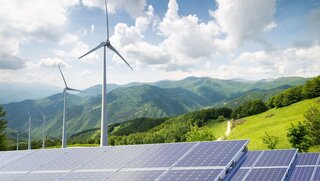Germany's accelerating energy transation
Germany’s Accelerating Energy Transition

Key points:
- Renewable capacity growing rapidly, in absolute amounts and share
- Energy storage and grid build-out accelerating
- Energy efficiency on demand side improving
- Heating transformation underway, partly led by the market and encouraged by policy
- Results are apparent, as emissions fall in Europe and gas consumption declines
Since the Russian invasion of Ukraine in 2022, the transition to clean energy in Germany and Europe has accelerated, continuing a longer-term trend away from fossil fuels that was already underway. Renewable capacity is increasing across the board, heat pumps and electric vehicles are helping electrify heating and transport, and new funds are coming available for energy saving measures across the economy. While a number of issues remain unresolved or subject to debate, the energy transition is both a long-term commitment and process that requires adaptation and adjustment when major new events intervene.
The Russian invasion of the Ukraine was a shock to the European energy system, which had become overly reliant on gas imports from a variety of sources, especially Russia. Germany and the EU have responded to this external shock by a variety of long-term and short-term strategies. Importantly, the government now views renewable energy as “a matter of national security,” and a top domestic policy priority. This increased immediacy around energy security adds to the already great urgency to accelerate the clean energy transition to address climate change.
While the focus is typically on government policy, it is important to recognize that energy consumers, including individuals and companies, are deeply involved in, affected by, and contributing to this transition. When evaluating the progress of Germany’s energy transition since the war began, perhaps the single most important development relates to the decisions of individual citizens and consumers to shift away from gas. Whereas the EU set a target to reduce gas demand by 15% compared to the prior five-year average, on a weather-adjusted basis gas demand has already been cut by more than this, with households leading the way in cutting gas consumption.[1] High prices are the primary driver, but we shouldn’t discount that this factor goes along with growing awareness of the need to cut gas consumption and, for many, the benefits to switching to non-fossil fuel heating fuels. Overall, the response to the energy crisis has been a surprise to many energy analysts, who had long considered household energy demand as essentially inelastic over such time scales.
Reference
- Ben McWilliams and Georg Zachmann, "European natural gas demand tracker,"Brugel, October 2023, at https://www.bruegel.org/dataset/european-natural-gas-demand-tracker.
- "Osterpaket zum Ausbau erneuerbarer Energien beschlossen,” Startseite tscher Bundestag, 2022, at https://www.bundestag.de/dokumente/textarchiv/2022/kw27-de-energie-902620.
- “We’re tripling the speed of the expansion of renewable energies,” Federal Ministry for Economic Affairs and Climate, December 2022, at https://www.bundesregierung.de/breg-de/schwerpunkte/klimaschutz/amendment-of-the-renewables-act-2060448.
- “Stepping up the PV roll-out,” 2023, at https://www.bmwk-energiewende.de/EWD/Redaktion/EN/Newsletter/2023/05/Meldung/direkt-answers.html.
- “Germany sets renewable power record in 2022, but is off-track for 2030 target,” Journalism for the energy transition, 12 December 2020, at https://www.cleanenergywire.org/news/germany-sets-renewable-power-record-2022-track-2030-target.
- “Germany hails EU deal on renewable energy raising target for 2030 to 45%," The Associated Press, 17 June 2023, at https://abcnews.go.com/Business/wireStory/germany-hails-eu-deal-renewable-energy-raising-target-100153583.
- “An electricity grid for the net zero future,” NFederal Ministry for Economic Affairs and Climate, 2023, at https://www.bmwk-energiewende.de/EWD/Redaktion/EN/Newsletter/2023/05/Meldung/news1.html.
Authors
Anders Hove (OIES), Yuxia Yin (GIZ)
*This article was originally published in China Power Enterprise Management, Issue 8, 2023, contributed by the Sino-German Energy Partnership.